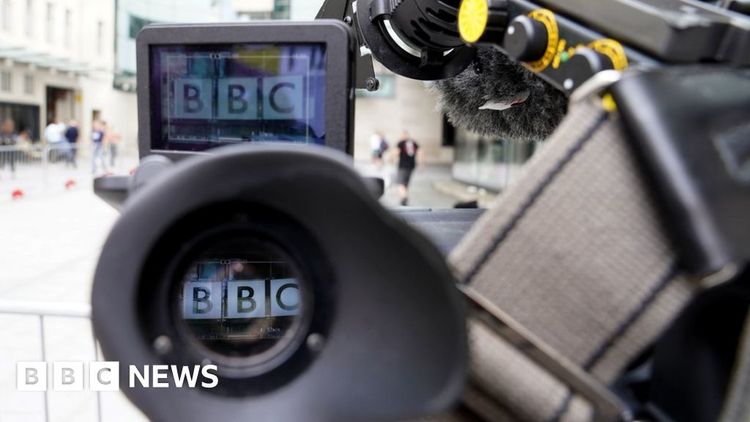BBC presenter row: Family contacted just twice

Watch: Tim Davie, the BBC's director general, faced questions on Tuesday about the corporation's presenter row
By Mattea Bubalo
BBC News
The BBC made just two attempts to contact the family of the young person at the centre of the presenter row after their complaint was made - despite judging it to be very serious.
A new timeline from the corporation says an email was sent followed by a call that failed to connect.
The presenter was spoken to seven weeks after the initial complaint, the night before the Sun published the claims.
The initial report has been denied by a lawyer for the young person.
The Sun have not put up anyone for interview regarding the BBC's timeline and did not directly respond to questions put to them.
In a statement released on Tuesday, the BBC said it had been asked to pause its investigations into the allegations while the police assessed the situation.
It comes after detectives held a virtual meeting with BBC representatives on Monday.
The allegations, first reported by the Sun, are that a BBC presenter paid a teenager for explicit photos - however, a lawyer for the young person, who is now 20, has disputed this version of events.
If the presenter obtained sexually explicit images of the young person when they were under 18, that could be investigated as a possible criminal offence.
However, the family told the BBC they had contacted the police and were told nothing illegal had taken place.
They said their primary concern was stopping the alleged payments being made to the young person, who they said was struggling with a drug problem.
"Without the money, my partner's child would have no drugs," the step-father alleged to the Sun.
There have been questions over how the BBC has handled the complaint, which director-general Tim Davie acknowledged was damaging to the corporation.
Mr Davie addressed some of the issues while speaking on Tuesday as part of the publication of the BBC's Annual Report.
The family of the young person first contacted the BBC on 18 May, when they attended a BBC building to make the complaint in person.
A day later, on 19 May, the complainant contacted the BBC's Audiences Services, with the allegation passed to the BBC's Corporate Investigations Team.
Mr Davie was asked about the difference between the complaint on 19 May, and the complaint made in The Sun story.
In a summary of the 29-minute call received on 19 May, Mr Davie said it "did not include an allegation of criminality - but was very serious".
The family member then did not respond to an email sent by the corporation, the BBC said in an updated timeline released on Tuesday afternoon.
On 6 June, a follow-up phone call was made to the number provided by the family member to the BBC's Corporate Investigations Team, but "this call did not connect".
"No additional attempts to contact the complainant were made after 6 June, however the case remained open throughout," the timeline added.
A senior manager only held a conversation with the presenter involved in the allegations on 6 July, seven weeks after the initial complaint was made.
This was to make them "aware of the claims being outlined by the Sun" in their story published the following day, the BBC said.
The BBC made contact with the police regarding the complaint on 7 July.
In a statement on 9 July, the BBC said it had suspended the presenter in question.
Addressing why it took weeks to speak to the presenter, Tim Davie said allegations the investigations team "needed to balance the concerns of duty of care and privacy."
"You don't take that complaint directly to the presenter unless it has been verified.
"It is right to validate that and to have the specialist team talk to the individual before taking it forward," he told the BBC Radio 4's World at One programme.
But, he said he wanted to examine whether the BBC raises "red flags quick enough" of complaints of this nature.
In the same interview, Mr Davie was also asked whether he knew "categorically" if the presenter paid for the legal fees of the young person.
"That's not information I am party to," he said. "I don't even think that's something for the BBC," and nor is whether the presenter and the young person have spoken, he added.
This timeline of events laid out by the BBC conflicts with the Sun's initial report that the BBC did not call the family after the initial complaint was made.
In the paper's report on Monday, it was stated: "The family say no-one from the corporation rang them for a proper interview after the initial complaint."
However, this appears to be contradicted by the Sun's latest interview with the parents of the young person, in which the step-father is quoted as saying allegations were put to the BBC "for an hour".
The corporation added that it had published an update to the timeline of events to address questions on how the complaint was initially managed, setting out key dates and adding some more information.
"The BBC has processes and protocols for receiving information and managing complaints when they are first made. We always take these matters extremely seriously and seek to manage them with the appropriate duty of care," the statement read.
At a virtual press briefing relating to the publishing of the BBC's Annual Report, the director-general confirmed he has asked "for a review", which will be internal, of how things are red flagged.
He said: "Any affair of this nature is serious. Trust is absolutely fundamental to the BBC. It is too early to say how this impacts the BBC in terms of trust."
Related Topics
































































